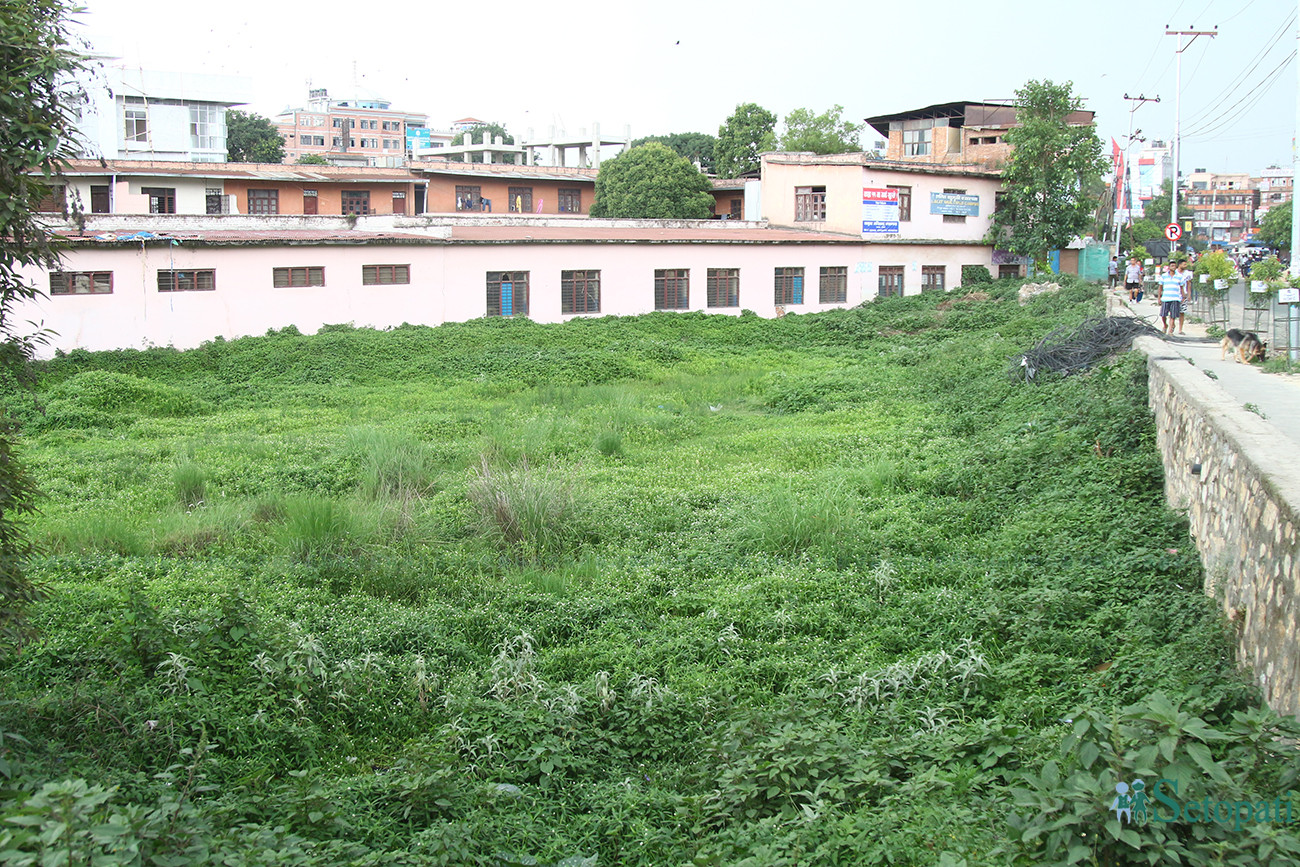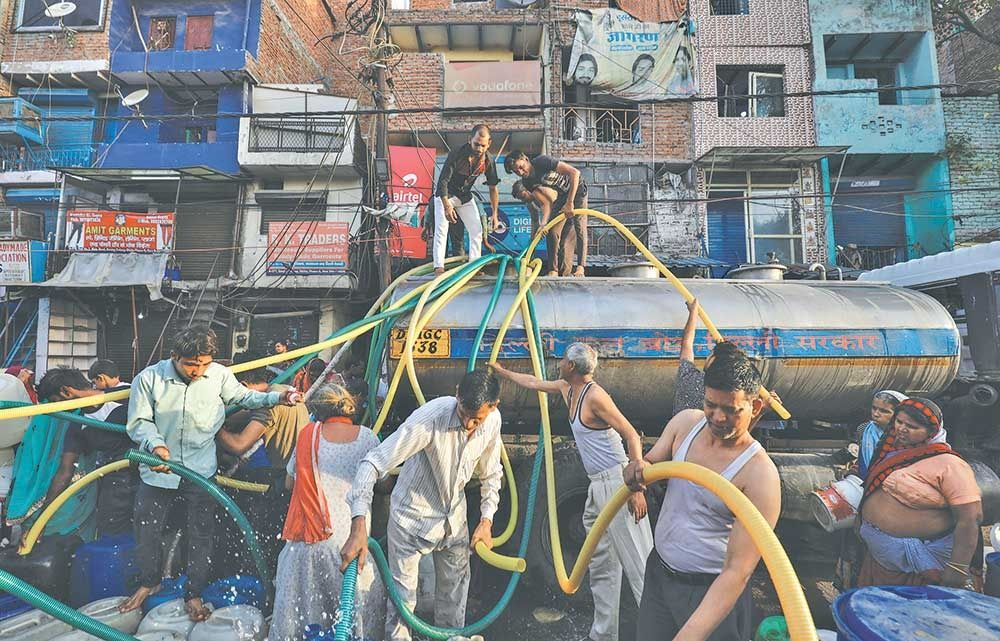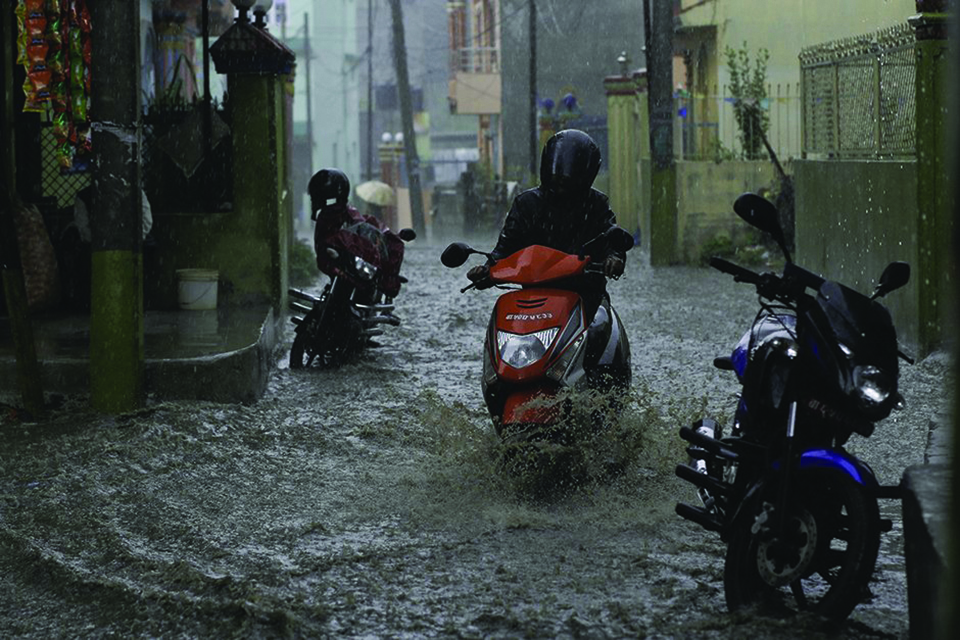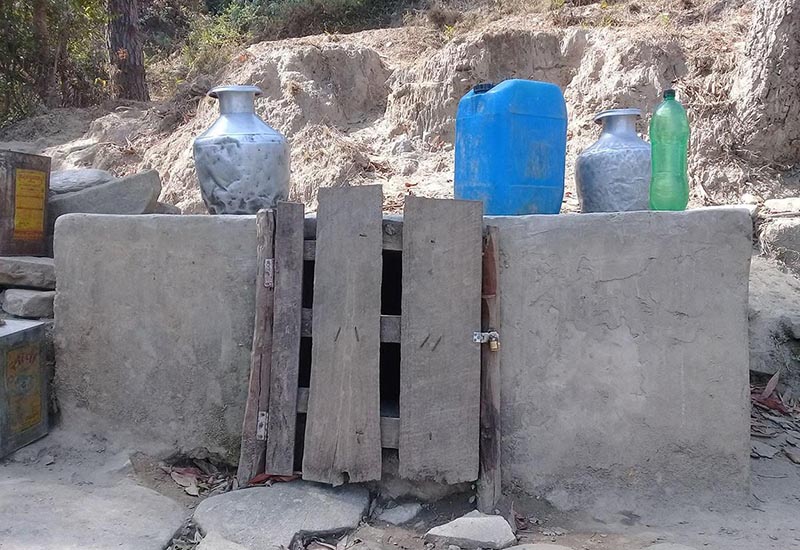Water
सप्तपाताल पोखरीलाई पुरानै स्वरूपमा ब्युँताउने सर्वोच्चको आदेश
काठमाडौं, असार २३

घाँसघारीमा परिणत सप्तपाताल पोखरी। तस्बिर: निशा भण्डारी/सेतोपाटी
सर्वोच्च अदालतले लगनखेलको सप्तपाताल पोखरीलाई पुरानै स्वरूपमा ब्युँताउन बाटो खोलेको छ। नमूना मच्छिन्द्रनाथ स्कुलले लामो समयदेखि पोखरीको जग्गा अतिक्रमण गरेर बसेको थियो।सर्वोच्चका न्यायाधीशद्वय दिपककुमार कार्की र तेजबहादुर केसीको इजलासले स्कुलले मिचेको जग्गालाई सार्वजनिकमा परिणत गर्न आदेश दिएपछि पोखरी ब्युँताउन बाटो खुलेको हो।
'स्कुलले ओगटेर बसेको सप्तपाताल पोखरीको जग्गा सार्वजनिक गर्नुपर्ने हाम्रो माग थियो,' यो मुद्दामा सुरूआतदेखि नै वकालत गर्दै आएका वरिष्ठ अधिवक्ता पूर्णमान शाक्यले सेतोपाटीसँग भने, 'सर्वोच्चले हाम्रो मागबमोजिम आदेश दिएको छ।'लगनखेल बसपार्कनिर अशोक स्तूपसँगै कुनै बेला १४ रोपनीभन्दा ठूलो पोखरी थियो। ‘सप्तपाताल’ भनिने यो पोखरी अब चारतिरबाट मिचिएर डेढ–दुई रोपनी मात्र बचेको छ। त्यहाँ पानी छैन, घाँसघारी मात्र छ।पोखरीलाई पुरानै स्वरूपमा फर्काउन लगनखेलका स्थानीय १४ वर्षदेखि कानुनी लडाइँ लडिरहेका थिए।
सप्तपाताल बचाउ अभियानका अगुवा ७३ वर्षीय पूर्ण स्थापितले यसमा मुख्य भूमिका खेले। उनले पोखरी अतिक्रमण बन्द गराउन २०६१ सालमा सर्वोच्चमा मुद्दा हालेका थिए। एकचोटि जिते पनि। अतिक्रमण नरोकिएपछि दोस्रो रिट हालेका हुन्।
Read more: सप्तपाताल पोखरीलाई पुरानै स्वरूपमा ब्युँताउने सर्वोच्चको आदेशपानी जोगाउन मोदीको अभियान
असार १७, २०७६
नयाँदिल्ली — पानीको अभाव चरम हुँदै गएपछि भारत सरकारले सोमबारदेखि जल सञ्चय गर्ने अभियान सुरु गरेको छ । पानीको बढ्दो संकट सम्बोधन गर्ने उद्देश्यसहित ल्याइएको अभियानअन्तर्गत भारत सरकारले आकाशेपानी संकलन, पानीको संरक्षण र पानीका स्रोतलाई पुनर्जीवन दिने जनाएको छ ।

पहिलो चरणमा अभियान देशका २ सय ५४ जिल्लामा सञ्चालन ल्याइने छ । इन्जिनियर र अन्य प्राविधिकहरूलाई विभिन्न १ हजार ५३९ वटा ब्लकमा खटाउने योजना छ । त्यसैगरी सरकारले सबै सांसदहरूलाई आआफ्नो क्षेत्रमा स्थानीय विकास कोषअन्तर्गत योजनाहरू छनौट गर्दा पानी संकलनसम्बन्धी योजनालाई प्राथमिकता दिनसमेत भनेको छ । साथै, पानी संरक्षणमा नागरिकलाई प्रेरित गर्ने उद्देश्यले पुरस्कृत गर्ने योजनासमेत सरकारले बनाएकको भारतीय सञ्चारमाध्यमले उच्च सरकारी अधिकारीलाई उद्धृत गर्दै लेखेका छन् ।
Read more: पानी जोगाउन मोदीको अभियानSaving Kathmandu

June 11, 2019 Kripendra Amatya : The houses and structures which have blocked rajkulos and canals should be shifted elsewhere
With the onset of monsoon, pictures of Kathmandu streets being waterlogged have started to surface in social media. Royal canals, called rajkulo, are blocked by infrastructures. Concrete building and blacktopped roads stop infiltration of rain in soil, causing the ponds to go dry. As water fails to enter the soil due to concrete houses and paved roads and the sewerage gets jammed due to litter, even light rains could cause spread of water on the streets in the capital city. And as the water cannot enter the soil, underground water level decreases every year and people are forced to dig deeper to extract the underground water.
Read more: Saving KathmanduWater crisis sparks migration in Bhojpur
Bhojpur, July 2, 2019
Acute shortage of drinking water has forced people to migrate from Manebhanjyang of Ram Prasad Rai Rural Municipality to the river banks and other villages of Bhojpur.

Manebhanjyang’s Archale, Bhorleni, Ambote, Gada, Agaute, Ranagaun and Gurans have been hard-hit by drinking water crisis. Those living in Manebhanjyang have been facing acute shortage of water for many years as water sources have gone dry.
Read more: Water crisis sparks migration in BhojpurHow two Sikhs built Kathmandu’s water pipelines and laid its roads http://bit.ly/2XbrJ6J

Jun 11, 2019 : The saying goes that Sardar Manohar Singh could point to where each water pipeline had been laid under Kathmandu, and where all the valves and chambers and reducing holes were. Manohar--who came all the way to Kathmandu from Rawalpindi in 1931--knew all this for a simple reason: he had played a crucial role in laying them. And when Kathmandu started tracing networks of roads above those very pipelines, it was Manohar’s son, Sardar Hardayal Singh, who would build paths and ensured their maintenance.
Read more: How two Sikhs built Kathmandu’s water pipelines and laid its roads http://bit.ly/2XbrJ6J
